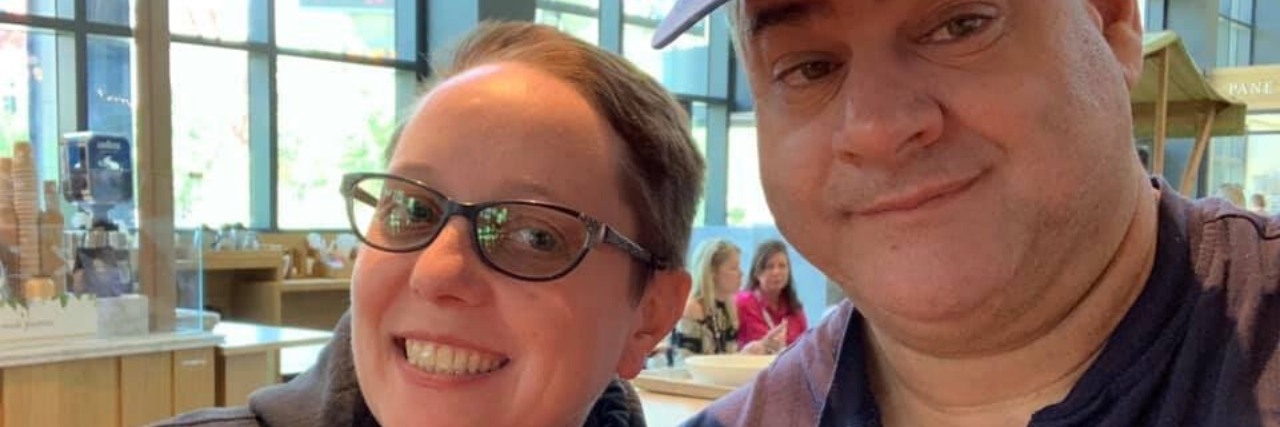Advice From My Husband: What to Know If Your Partner Has Uncovered Sexual Abuse
Editor's Note
If you’ve experienced sexual abuse or assault, the following post could be potentially triggering. You can contact The National Sexual Assault Telephone Hotline at 1-800-656-4673.
To the brave partners of survivors of childhood sexual abuse: Thank you. You are the unsung heroes of trauma recovery. So much focus is placed upon the therapeutic alliance, groups, medication, retreats, friends and mindfulness. But one huge factor in healing from trauma is having a committed and supportive partner.
For those of us who began our healing journeys after having been married or in a serious relationship, often the most difficult and scary part of diving into the healing process is what it means for our relationships. Personally, I’ve found the track record for relationships surviving this kind of upheaval isn’t great. Dealing with the symptoms of a partner with post-traumatic stress disorder (PTSD), the ups and downs of therapy, adjusting to medications and changes that will inevitably occur are daunting at best and overwhelming at worst.
From my own experience with my husband of almost 22 years, while he knew “something” happened to me as a child, he didn’t know what, and frankly I didn’t have a full sense of it either. At 38 years of age and after 17 years of marriage, my memories of sexual abuse resurfaced and it literally turned our world upside down. I was having full-blown PTSD symptoms, had completely withdrawn from him sexually and was feeling completely out of control. It would have been easy and even forgivable for a spouse at that point to say “I can’t do this. This isn’t what I signed up for and I’m not sure I have the patience or strength to support you through this, even if I love you.” And frankly, if that had been the case, I would have completely understood. I felt this intense sense of guilt for being a “burden” and for not being the spouse he deserved.
But … knowing I meant enough to him and that he was committed to “our” healing journey has been one of the most rewarding and meaningful things in my life.
How did he do this and what advice could he offer to other partners of sexual abuse survivors? These are just a few things that we both agree have been crucial to being able to stay the course.
Give them the benefit of the doubt that if they really remembered what happened, they would have told you. We aren’t deliberately hiding secrets. Allowing these memories to surface is counterintuitive. We’ve repressed them for years because we didn’t want them to disrupt our lives.
2. Acknowledge your feelings about the situation.
This is a monumental change in your life. Acknowledging all that you are feeling is crucial. You are probably angry, frustrated, sad, rejected and a myriad of other feelings. These are normal and not a reflection of your love for your partner.
3. Seek professional help.
I’m a firm believer that everyone could benefit from therapy. However, the partner of someone who has experienced childhood sexual abuse can really benefit from having an outside perspective to help them cope. A therapist can not only hold space for the feelings you may not be able to express to your partner, but they may be able to help you navigate being a supportive partner during a difficult process.
4. It’s not personal.
Please try to understand that no matter how personal it feels, most of what your partner is dealing with is shame and pain that has nothing to do with you. The rejection may feel personal, but it really isn’t about you. This has been the most difficult part of our own healing journey. I want more than anything for my partner to recognize how much I love him, even if sometimes my behavior feels like I’m pushing him away.
The bottom line is that the psychological injury that is trauma from sexual abuse occurs in a relationship. Studies have shown that healing from this kind of injury can only occur through connection with others. I cannot imagine a more important and healing connection than that of a partner willing to stay the course with you.
To my Honey Bunny: I love you so much. Thank you for not running for the hills. Thank you for committing to our healing journey. And thank you for being an amazing role model for what a partner can and should be to a survivor of abuse.
Image via contributor

